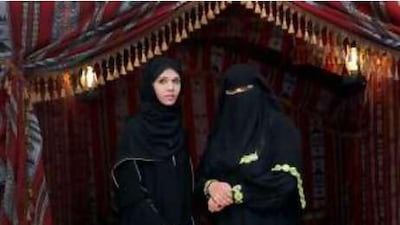SHARJAH // Still groggy from anaesthesia, Maryam al Naqbi reached for her phone and, with great difficulty, typed out a poem to send to all her friends. In it, she declared the birth of her son - which took place three years after she married - as the birth of a "new morning" in her life.
"My husband just stood there watching me as I was typing away this poem instead of resting," she smiled, recalling the incident last August. "He didn't dare interrupt my creative train of thought." Mrs al Naqbi is one of hundreds of Emirati female poets who, until last month, did not have a public place where she could share her poetic creations. That was when the Sharjah Centre for Popular Poetry organised the first female poets' majlis. The centre plans to turn the "poetic majlis" into a regular gathering of female poets from across the UAE, and the next session is scheduled to take place during Ramadan.
At the majlis, poets like Mrs al Naqbi will get the chance to recite and explain the story behind their poems. For instance, Mrs al Naqbi translated her struggle to become a mother into a heartfelt poem dedicated to her son, Mohammed. Reading from her phone, the 30-year-old softly recited the poem: "The morning that brought Mohammed into my life is the most precious morning of my small world. "It is a morning of pure goodness, a morning of renewed faith and purity.
"It is a morning of light that basked the world with its light, making it beautiful. "Oh Mohammed, you are my help and support in life, where the only place for you will be in my eyes." Like most female Emirati poets, Mrs al Naqbi writes under a pseudonym; hers is Sajaya al Rouh. "While it is slowly changing, society still doesn't approve of Emirati poetesses," she said. "Often we have to keep our identities a secret out of respect for our family names."
Mrs al Naqbi has been writing and publishing poetry in local newspapers since her teenage years. One of her idols is a female poet known as Fatat al Arab ("the girl of Arabs"). It was her nod of approval that helped launch the poetic career of one of the most influential men in the country: the Ruler of Dubai, Vice President and Prime Minister of the UAE, Sheikh Mohammed bin Rashid. Now retired, Fatat al Arab has been repeatedly honoured, but her real name, Ousha bint Khalifa Al Suwaidi, was made public only recently.
"There are many talented Emirati poetesses, but unlike the Emirati male poets, we rarely get any support or publicity," said Mrs al Naqbi. "Many just write in secret and never get the courage to publish their pieces." Some poets, like Nawal Salem, 30, dared to go public. Indeed, she cofounded the biweekly poetry and cultural newspaper, Hamaleel, two years ago. Ms Salem, who writes as Nasaym al Sada, said she had used her belief in the "power of poetry" to break down barriers.
"There is a section in the paper that publishes poems written by prisoners, giving them a venue to express themselves and heal their inner conflicts through their poems," she said. She added that her visits to prisons had inspired her work. "One should never underestimate the power of a poem." She often writes about the plight of single women and "poems peppered with sadness" as she worries about her future on her own.
For women of earlier generations, being a poet was far more difficult than it is for young women now. "My husband just didn't understand my sensitivity and my poems," said Jamila al Ruwahi, who is in her late 40s and divorced with two children. She has been writing in both Nabati and Faseeh (classical) poetry about social and political issues for more than 25 years. That, however, did not pay the bills, so she took up a job as an Arabic teacher.
"There was a time when rulers in our regions kept a poet in their courts," she said. "Sometimes the poet's words were more influential than the officials themselves. "The role of a poet has diminished greatly in our modern societies." @Email:rghazal@thenational.ae

